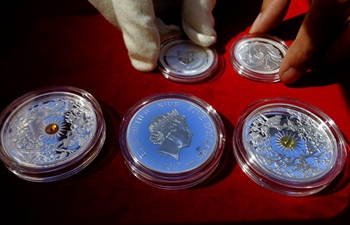WASHINGTON, June 24 (Xinhua) -- Chinese researchers have developed new magnetic particles for oil-water separation which can separate micro-scaled oil droplets from water rapidly and efficiently.
Scientists from the Key Laboratory of Bio-inspired Materials and Interfacial Science under Chinese Academy of Sciences described in the latest issue of Advanced Functional Materials journal these particles called hydrophilic/oleophilic magnetic Janus particles.
Oil pollution has become a global challenge and oils are usually classified as floating oils, dispersed oils, surfactant-stabilized oil droplets and surfactant-free micro-scaled tiny oil droplets, according to the study.
In recent years, effective separation of floating oils, dispersed oils and even surfactant-stabilized oil droplets have been achieved. However, the separation of micro-sized oil droplets from water has often been overlooked.
Micro-scaled oil droplets with diameters less than 20 micrometers are very stable in water, so it's hard to use traditional methods to separate these micro-scaled oil droplets from water.
Chinese researchers have developed an emulsion interfacial polymerization approach that can be expanded to large-area fabrication of two-dimensional Janus film actuators.
On the basis of these studies, the researchers synthesized hydrophilic/oleophilic magnetic Janus particles by emulsion interfacial polymerization and the interfacial assembly of Fe3O4 nanoparticles.
When adding the particles to the oil-in-water emulsion and subsequently shaking for one minute, the originally stable emulsion rapidly formed layers. After manipulation with a magnetic field, the upper oil phase could be rapidly attracted toward the magnet.
The whole process was accomplished in two minutes. The separation achieved a high efficiency (or more than 99 percent) and is applicable to various oils and various oil contents.
Researchers also found that the oil-affinity surface of Janus particles was beneficial for capturing a large number of tiny oil droplets to make them coalesce.
Finally, like surfactant molecules, these Janus particles could adsorb at the interface of large oil droplets to stabilize them, according to the study.
These Janus particles can be self-assembled on the interface of the larger oil droplets with their oil-affinity concave surface toward the oil phase and their water-affinity convex surface toward the water phase.
These particles provide a good candidate for application in the clean-up of industrial wastewater and water purification.

















